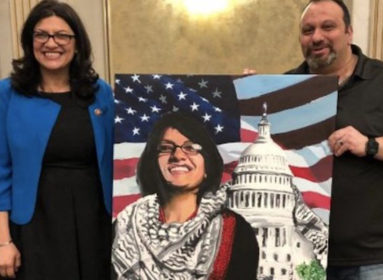
Orthodox hip-hop artist talks about his unusual path to Judaism
By Cindy Mindell
Yitz Jordan, known by his stage name, Y-Love, is a Los Angeles-based hip-hop artist. A former Chasid, Jordan is considered the first African-American Orthodox Jewish hip-hop rapper. (“I don’t like to say ‘ex-Orthodox’ or ‘ex-Chasidic,’” he explains, “because that’s only really a statement about my observance level, whereas my beliefs are still pretty much as Orthodox as they always were.”)
Jordan was born and raised in Baltimore by his Christian Ethiopian father and Puerto Rican mother. He first became interested in Judaism at age seven, when he saw a TV commercial proclaiming, “Happy Passover.”
During his 2010 trip to Israel, The Jerusalem Post called Y-Love a “spiritual, rapping guru” who is “front and center in a trending hip-hop revolution.” He was named to The Jewish Week’s 2009 “36 Under 36,” an annual list of 36 notable Jews younger than 36.
Jordan rhymes in a mixture of English, Hebrew, Yiddish, Arabic, Latin, and Aramaic, often covering social, political, and religious themes. In 2005, he released “DJ Handler Presents Y-Love: The Mixtape.” In 2008, he released his first full-length album, “This Is Babylon.” He has said that his music embodies Jewish values and appeals to an audience of conservative-minded hip-hop fans.
In 2012, he came out as gay. In addition to being a hip-hop artist, Y-Love is also an LGBTQ activist and writer whose essays and op-eds have appeared in The Huffington Post, Quartz, The Advocate, and The Jewish Post.
Jordan’s life story is included in a new anthology, The Human Agenda: Conversations about Sexual Orientation & Gender Identity. He will be part of a panel discussion about the book on Thursday, June 25 at the Hartford Public Library.
He spoke with the Ledger about his journey to Judaism and how Torah informs his activism.
Q: Has your journey to Judaism been met with opposition or support?
A: Judaism is something I was very much into ever since I was a little kid. When I first saw that commercial on TV and I first started drawing six-pointed stars on everything and told my mother that I wanted to be Jewish, initially it was only my mother’s mother who understood me. My mother tried to be supportive and went to a woman at her job the following day and told a woman, “My son wants to be Jewish” and that woman invited us over for my first Passover seder.
From the very beginning, there’s always been someone there to support me. My mother would eventually be less and less supportive as I grew up — when I started wearing a yarmulke in high school and learning Hebrew, I was becoming visibly different from my peers, and I guess she was trying to shield me from being the odd one out.
Even then — when I had to fight tooth and nail at home for the ability to learn and experience more Jewish things, to be able to go to services on Shabbat and observe the holidays — I had plenty of friends at Johns Hopkins University, in the Jewish Students Association and the kosher dining hall. I’ve never felt that I was absolutely alone, even when I started conversion and had to deal with all the racism in Brooklyn when I first moved there from Baltimore in 1999. There were the rabbis who did my conversion, a couple of people in the community, and eventually a rabbi’s family who would take me in and make me part of the family, so I never was completely without support at any time.
Today, since coming out in 2012, there’s been support from places I wouldn’t have expected – love from friends from back in the day at yeshiva; even my old rabbi this past Shavuot left me a voicemail. The fact that there’s still Orthodox support from the community that I thought would be the most devoid of support is just mind-boggling to me sometimes.
Change is happening in the Orthodox community and especially in the Chassidic world. People say, “They still speak a language from 200 years ago, they still wear clothes from 150 years ago, so therefore they must still think like 150 years ago.” That’s very much not the case. Every community evolves.
Just like in physics – for every action, there’s going to be an equal and opposite reaction for piece of resistance: was there racism in the Jewish community? Yes. Was I served last in the pizza shop? Yes. But was there someone else in the pizza shop willing to sit down and talk to me and hang out with me? That was also the case. Was there resistance when I first started doing hip-hop in yeshiva? Yeah. Were people trying to tell me that it was a goyish style of music and an unholy thing? Yeah. Did I have a chavrusa sitting there and learning with me and a rabbi who said, “Go ahead and continue doing this”? That’s also true. To tell only the resistance side of the story is only telling half the story.
Q: What was your Israel experience like, in terms of acceptance and/or rejection?
A: My year in Israel was from 2000 to 2001, when I was learning in the Ohr Somayach yeshiva in Jerusalem. As far as Israeli history and current events were concerned, that was not a quiet time: the intifada was going on. The upside of the intifada was that it brought a lot of Jewish people together. What I was hearing in the Haredi world in Jerusalem was comments like, “Why are you speaking Yiddish?” “Why are you Ashkenazi?” “Why are you Chasidic?”
There was racism but not on the same scale and not to the same degree [as in Brooklyn]. Racism as we know it is very foreign to Judaism and was something picked up along the way in Europe and in America and in European colonies so I didn’t even expect racism on the same level when I went to Israel.
My most recent trip to Israel was in 2010 and on the way out, I had six security checkpoints, only five of which were legit.
The sixth was kind of funny: one of the soldiers pulled me to the side and then into a private room and he tells me, “I know you’re Y-Love, right?” and he ended up being one of my fans and wanted me to freestyle for him privately.
One woman in the airport asked me, “Why were you in Israel?” “I was here for Sukkot.” “Were you here for Sukkot or the Feast of Tabernacles?” “No, I was in Yerushalayim for Sukkot.” “Oh, you don’t look Jewish” and it was a Russian woman and I wanted to say, “And you do? Don’t start with me, Natasha.” That was the level of offense I was feeling, like “You’re going to tell me with your blond hair and blue eyes that I don’t look Jewish?” What is it about me that didn’t look Jewish? That’s racism. Having dreadlocks was another thing. I was pulled to the side by cops I don’t even know how many times. I’d say that that’s a devolution of Israeli society – that’s a modern thing. Even 15 years ago it wasn’t like this. Unfortunately, I think that a lot of the racism from America and Europe is seeping into Israel, even to the point that there was a neo-Nazi group in Petach Tikvah a few years back.
Q: What is your fan base like in Israel?
A: I haven’t been back to Israel since coming out [in 2012]. I wanted to go to Tel Aviv Pride this year and it didn’t work out. So I don’t know what my fan base is like now. Historically, I’m kosher hip-hop, I’m every yeshiva kid’s favorite artist that they’ll tell their rabbi that they listen to. I’m the hip-hop you can play in front of your parents. When I go to Ben Yehuda in downtown Yerushalayim (Jerusalem), I might as well be in One Direction or Justin Bieber – as much love as you would expect for any urban artist in a major urban market here in America like New York, L.A., Chicago is the same type of diverse young people crowd that I was getting in Jerusalem. I would like to hope it’s still the same way. The only real haters that I’ve gotten since coming out – one was in Beit Shemesh and the rest were in Brooklyn. I’d like to think that my fan base is still intact in Jerusalem but I don’t know. I’ve worked with Hadag Nachash, Segol 59, and pretty much everybody who’s in the Jerusalem hip-hop scene, and with Shotei HaNevuah back in the day. When I came out in 2012, it hit the newswire at 9 a.m., which was 4 p.m. Israel time; within a matter of hours, Israeli artists were already tweeting their support.
Q: As a social justice activist, do you see a link between Judaism and activism?
A: I jokingly said on a video for the Jewish channel, when speaking about Chanukah, that “Maccabi” was not the last name but an acronym for “Mi camocha ba’elim HaShem?” – “Who among the heavenly powers is like You, O God?” The militant people who rose up against the Greeks changed their last names to “Maccabi.” Militant activism has always been in Judaism – the idea that a group of followers of Judah Maccabi would change their names to Maccabi and go up and fight against an imperial power that was committing injustice. Jews were saying that their lives mattered long before it was a hashtag.
I don’t understand how someone can ask for glatt kosher to be brought to them by a waiter in a restaurant and not give the same type of gravitas to the paycheck of the waiter who brought it to them. All of chapter six of the Babylonian Talmud’s Baba Metzia tractate is called “he who hires workers” and is all about what workers’ wages should be. I think that if the sages who wrote the Talmud were alive today, they would have a little to say about the labor situation. If there’s a mitzvah of bal tashchit – you’re not supposed to willingly destroy fruit trees or anything that can provide food or shelter – then how do we sit back and just let a BP oil spill happen? How do we just sit back and let environmental catastrophies happen? If the Torah doesn’t want us to destroy even one fruit tree, we’re going to sit back and let companies like Monsanto destroy soil for generations? It doesn’t make sense, from a Torah perspective not to get involved in a lot of activist causes.
LGBT Pride Month Panel on Sexual Orientation & Gender Identity featuring Y-Love: Thursday, June 25, 6 p.m., Hartford Public Library Center for Contemporary Culture, 500 Main St., Hartford. For information: hplct.org.








 Southern New England Jewish Ledger
Southern New England Jewish Ledger









